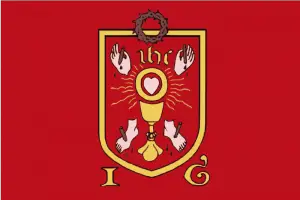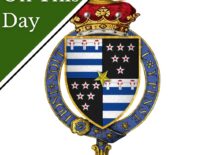On this day in Tudor history, 9th October 1536, in the reign of King Henry VIII, the rebels of Horncastle, Lincoln, dispatched their petition of grievances to the king and also north into Yorkshire.
These were the rebels of the Pilgrimage of Grace rebellion, an uprising in the north of England which was sparked off initially by trouble in Lincolnshire. This trouble, in turn, was caused by discontent over the dissolution of Louth Abbey, the government commissions in the area and rumours that these commissions would confiscate jewels and plate from churches and impose new taxes.
Trouble began on 1st October 1536 when Thomas Kendall, Vicar of St. James's Church, Louth, preached a sermon at evensong regarding the Church and that Catholic faith being in danger. The following day, the Bishop of Lincoln's registrar was seized by a group of local men led by the local shoemaker as he tried to read out Thomas Cromwell’s commission to the townspeople. His papers were ripped from his hands and burned. Then, on 3rd October, 3,000 men marched from Louth to Caistor, where they seized the king's subsidy commissioners.
On 4th October 1536, Dr Raynes, the chancellor of the Bishop of Lincoln, and Thomas Wulcey (or Wolsey), one of Cromwell's men, were murdered by the rebels at Horncastle. Articles of grievance were drawn up by the gentry, the local sheriff and his brother, and then presented to the crowd gathered at Horncastle. The people responded to these grievances by holding up their hands and saying, "We like them very well." Their grievances included the dissolution of the religious houses, the grant to the king of the tenths and first-fruits of spiritual benefices, the appointment of Thomas Cromwell, Richard Rich and other "such personages as be of low birth and small reputation" onto the king's council and the promotion of archbishops and bishops who they felt "subverted the faith of Christ". These articles of grievance were dispatched to King Henry VIII on 9th October 1536.
On 11th October, a herald arrived at Lincoln with the king's reply. The king did not give into the rebels' demands and concluded his message with a warning:
We charge you, eftsoon, upon the foresaid bonds and pains, that ye withdraw yourselves to your own houses, every man; and no more to assemble, contrary to the laws and your allegiances ; and to cause the provokers of you to this mischief to be delivered to our lieutenant’s hands or ours and you yourselves to submit to such condign punishment as we and our nobles shall think you worthy.
By 13th October, the East Riding, West Riding, North Riding and "all the commons of Yorkshire" were reported by Lord Darcy as being "up" in rebellion, and on 14th October, it was reported that the rebels were assembling to take York. Henry VIII offered mercy to those men who would "leave all their harness and weapons in the market-place of Lincoln", and sent instructions to the Duke of Suffolk on how to handle things if any new rebellion broke out:
if it appear to you by due proof that the rebels have since their retires from Lincoln attempted any new rebellion, you shall, with your forces run upon them and with all extremity ‘destroy, burn, and kill man, woman, and child the terrible example of all others, and specially the town of Louth because to this rebellion took his beginning in the same.
He also wrote to the Earl of Derby, giving him instructions on how to deal with the rebels at the Abbey of Salley in Lancashire:
We now desire you immediately to repress it, to apprehend the captains and either have them immediately executed as traitors or sent up to us. We leave it, however, to your discretion to go elsewhere in case of greater emergency. You are to take the said abbot and monks forth with violence and have them hanged without delay in their monks’ apparel, and see that no town or village begin to assemble.
By 21st October, the rebels had decided to march on London, but on 26th October, they halted at Scawsby Leys, near Doncaster, where they met troops captained by the Duke of Norfolk. The rebel force was said to be around 30,000 men, far outnumbering Norfolk's army, which was about a fifth of the size. However, the rebel leader, Robert Aske, chose to negotiate rather than fight. After negotiations, Norfolk gave promises from the king that the rebels' demands would be met and that they would be pardoned. Aske then dismissed his troops. Unfortunately, Henry VIII later broke his promises to the rebels and its leaders were arrested, tried for treason and executed.
Read more about the Pilgrimage of Grace Rebellion here.
Also on this day in Tudor history...
Image: The Pilgrimage of Grace banner bearing the Holy Wounds of Jesus Christ.




Leave a Reply